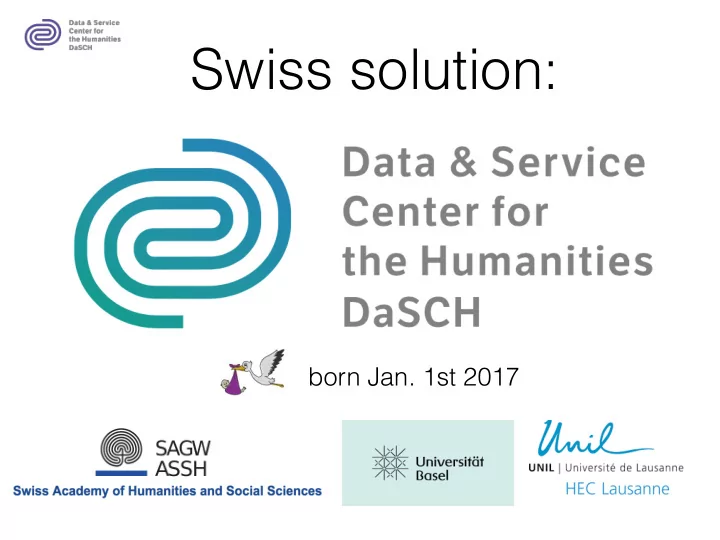

Swiss solution: born Jan. 1st 2017
DaSCH goals • Securing longterm , easy and simple access to qualitative research data in the Humanities • Support of Researchers in the creation of new and the Re-use of existing digital research data ☞ Service!
• Financed by the State Secretary of Education, Research and Innovation (SERI) as Enterprise of the Swiss Academy of Humanities and Social Sciences (SAHSS) • mandated to the Digital Humanities Lab of the University of Basel • Budget: CHF 500’000.- p.a. (3.3 FTE) • Partner: SWITCH (hosting, data storage)
Tycho Bahe’s data Kepler’s theory
Tasks/Goals • Take-over of existing , no longer maintained digital data and securing the long-term access to it • Development and operation of an adequate , reliable , robust , long-lived infrastructure (repository-software and server- software) • Support of ongoing and future research projects , that create digital data ☞ producers of knowledge • Support of research projects which are (re-) using existing research data (e.g. digital editions form the base for further research) ☞ consumer of knowledge • training and eduction („best practices“, tools etc.) • Networking (national und international) & Standards
Important features: FAIR data • All SW open source (github) • extensiv rights and permission system for those cases where necessary (legal reasons, embargo period) • persistent Id’s ( PID ) using the ARK identifiers (down to the single data object) • complete change history for objects and data fields • RESTful API for search, metadata and data • long-term archival strategy : ‣ multiple redundant copies on different media (HD, MT) ‣ standard formats for digital objects (data: RDF [turtle], media: J2K, mp4 etc.) ‣ technology watch and migration strategies
3 models • post mortem 😠 Take-over of data after project ended (sometimes very long after project end) ☞ problematic: - often documentation weak or completely missing - “reverse engineering” necessary • in vivo 🙃 On-going project which faces IT-challenges and conavts the DaSCH for support, consulting or collaboration ☞ much better, but already existing data often in bad shape • ab ovo 😋 optimal case: assistance and support from the beginning ☞ consulting already during “grant writing”-phase
DaSCH and NIE-INE • it’s not the same! ➡ DaSCH: SBFI/SAGW ➡ NIE-INE: swissuniversities P5 • very close collaboration!! (“best friends”) ➡ NIE-INE partially based on DaSCH SW-infrastructure ➡ NIE-INE adapts and expands the SW-infrastructure according to its needs
Information portal: http://dasch.swiss Email: info@dasch.swiss vera.chiquet@unibas.ch
Recommend
More recommend